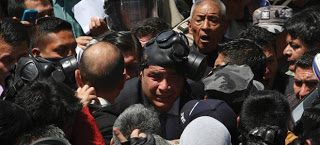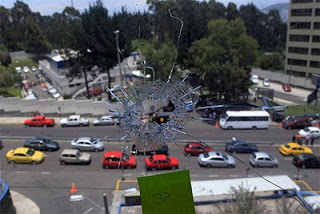
A successful tour of 7 countries in three continents made by President Hugo Chavez has produced 69 new agreements that will strengthen national development and consolidate the most powerful defense against imperial aggression: the union of nations and peoples.
The most influential ideologue of the twentieth century in the United States, Henry Kissinger, declared during the 1970s regarding the expansion of socialism in the region, “If the US can’t control Latin America, how can it dominate the world?” Today, Kissinger’s concern has returned to torment the US and imperial forces, but this time, their conspiring fist can’t seem to silence the awakening of nations in Revolution.
The US desperation during those years to subordinate countries in its “backyard” led to a series of coup d’etats, brutal dictatorships, sabotages, political assassinations, mass torture and disappearances, and the implementation of neoliberal, capitalist models that caused the worst misery, exclusion, poverty and alienation known in the region throughout history.
Under the limited US vision, strategies and tactics of aggression achieved their goal by the end of the century, and in almost all Latin American nations, with the exception of Revolutionary Cuba, subservient governments were put in place, hailing the US-imposed economic and political model of neoliberal representative democracy.
When a revolutionary Venezuelan soldier, Hugo Chavez, led a rebellion against the criminal, murderous and corrupt government of Carlos Andres Perez - a close ally of Washington - on February 4, 1992, the US underestimated him. A secret document from the Department of State, now declassified, commented on the event, stating “The coup attempt appears to have been the work of a group of mid level army officers…There is no indication of popular support for the coup plotters…”
At the same time, the US government recognized from its own surveys conducted in secret in Venezuela, “The incentive to follow support for Carlos Andres Perez is small; a recent poll showed him enjoying less than 20% of the electorate’s support…” In other words, the people did not support the neoliberal model imposed on their nation.
Another secret report from March 10, 1992 revealed Washington’s true concern regarding the popular uprisings in Venezuela, “A successful coup in Venezuela would be a serious blow to US interests in the hemisphere. Despite the short term negative impact on the poor and the middle class, we believe Carlos Andres Perez’s (CAP) economic policies are exactly what are needed to reform the Venezuelan economy…CAP’s overthrow would send a chilling message to the region about the viability of implementing economic reform.” [*Although the US classified the action as a “coup”, Hugo Chavez called it a “popular rebellion against a dictatorship disguised as democracy”].
Paraphrasing Kissinger, if the US couldn’t control Venezuela, how could it control the region? The principal US concern was not whether poverty would increase and the middle class would disappear, but rather whether the neoliberal model would be implemented, at any cost, because this would be the only guarantee of permanent US domination in the region.
When Hugo Chavez won office in Venezuela in 1998, Washington didn’t know what to do. The official policy was “wait and see” before acting. Imperial interests tried to “buy” the recently elected Venezuelan President several times, but their temptations didn’t bear fruit: Venezuela had chosen an irreversible path towards independence, sovereignty, dignity and revolution.
With the first changes - constitutional reform, a raise in oil prices and the rescue of OPEC - powerful interests were affected and US control over Venezuela decreased. The voice of Hugo Chavez began to be heard throughout the region, resonating with a rebellious song that inspired restless people’s movements.
PERMANENT AGGRESSION
Soon after, actions were initiated to try and neutralize what Washington had believed impossible: an anti-imperialist, socialist revolution in the XXI century, just south of the border.
A wave of aggressions struck Venezuela - the coup in April 2002, an oil strike and economic sabotage, assassination attempts, subversion, multimillion-dollar funding to opposition groups, elections meddling and a brutal psychological war executed through mass media - but they didn’t achieve their objective and revolutionary forces began to rise throughout the continent.
The birth of the Bolivarian Alliance of the Americans (ALBA) in 2004 opened the path towards a new foreign policy based on cooperation, integration and solidarity. Relations between sister nations in the region began to grow, strengthening the ties between states that shared a collective vision for humanity, and building a new economic model of commerce and trade that promoted mutual benefits and development.
ALBA TO A MULTIPOLAR WORLD
From ALBA, the Union of South American Nations (Unasur) was born with the objective of forging regional trade and creating a continental bloc of power capable of confronting world challenges.
As the Revolution in Venezuela grew, US aggression increased. In 2005, Washington launched an international campaign to “isolate the Venezuelan government” and classify it as a “rogue state”. “Hugo Chavez is a negative force in the region”, declared Secretary of State Condoleezza Rice in January 2005, beginning the bombardment of lies about Venezuela before world opinion that hasn’t ceased to date.
One year later, Secretary of Defense Donald Rumsfeld compared President Chavez to Hitler, and together with the Director of National Intelligence, John Negroponte, they denominated Venezuela the “largest threat to US interests in the region”. That year Venezuela was placed on a list of nations “not fully collaborating with the war on terror” and a US-imposed sanction prohibited the sale of defense equipment with US technology to the South American nation.
Chavez, recognizing the attempt to debilitate his armed forces, sought out other partners who weren’t subjected to US domination. Russia was the first country to offer to replace Venezuela’s military supplies.
For the first time since the fall of the Soviet Union, a Latin American nation began to build ties with Russia, without US involvement. The initial purchase of defense equipment opened the door to a new commercial and strategic relationship between Venezuela and Russia, thanks to the US embargo.
After Russia, Venezuela began to build relations with China, Belarus, Iran, Japan, Syria, Libya, India and other African, Asian and European nations. Chavez’s foreign policy initiated a radical transformation in the region and put Venezuela on the world map. “It was about radically changing the rules of the game: we wanted to relate to the world and not just one part of it. In reality, we were just learning how to walk with our own feet on the international stage. Don’t forget that before, we didn’t have our own foreign policy. Our foreign policy was directed by Washington”, explains President Chavez.
CHANGING THE BALANCE OF POWER
Chavez’s tour to Russia, Belarus, Ukraine, Iran, Syria, Libya and Portugal, from October 13-24, 2010, is a sign of a new multipolar world on the horizon. Of the 69 agreements signed with these nations, Venezuela will have numerous valuable benefits, including the construction of tens of thousands of homes for Venezuelan people, agricultural development, economic growth, energy production, new industries, diverse exports and strategic, balanced relations with other nations - all for the maximum benefit of the people of Venezuela.
Not one of the 69 agreements contains exploitative elements that could cause disadvantage for Venezuela. The foreign policy of the Chavez government doesn’t permit exploitation or capitalist contamination that could harm the South American nation.
For example, in Belarus, Venezuela won’t just buy heavy cargo mining trucks and public transport vehicles, but also will create joint ventures with Belarussian companies to establish factories in Venezuelan territory, assuring technological transfer which will aid in the diversification of Venezuela’s industries and the creation of jobs for the Venezuelan people.
IN A MULTIPOLAR WORLD, THERE CAN BE NO EMPIRE
“Venezuela must objey”, declared President Obama in reference to the agreement with Russia to develop nuclear energy for peaceful use. “We are monitoring the agreements between Venezuela and Iran to see if they violate the sanctions”, announced Philip Crowley, State Department spokesman, as though Washington was still the world police.
The desperate tone eminating from the White House is the product of its weakening global power - the Empire’s time is up and a new multipolar world has been born. Kissinger’s nightmare has come true - the US can’t dominate Latin America anymore, and much less the world. The revolutionary Venezuelan soldier they once underestimated has become a symbol of resistance against US hegemony, and is inspiring millions who seek a better world.
T/ Eva Golinger


